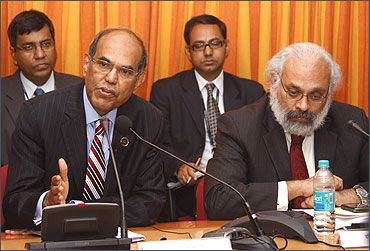 The former RBI governor launched his memoir earlier this month, entitled Who Moved My Interest Rates -- Leading the Reserve Bank of India through Five Turbulent Years.
The former RBI governor launched his memoir earlier this month, entitled Who Moved My Interest Rates -- Leading the Reserve Bank of India through Five Turbulent Years.
Admitting that he was not 'uniformly charitable' to P Chidambaram in his new book, ex-Reserve Bank of India Governor D Subbarao has said the former finance minister has still been 'very magnanimous and professional' in endorsing the memoir.
In the newly published book about his days as RBI governor, Subbarao was very critical of Chidambaram and Pranab Mukherjee, who served as finance ministers during his tenure at the central bank during 2008 to 2013.
"He (Chidambaram) has been very magnanimous about endorsing my book and he has been very professional about it. . . I was not uniformly charitable to him as well," Subbarao told PTI in an interaction in Mumbai on Monday evening.
But, Subbarao, who was the governor during one of the most trying times in the aftermath of global financial crisis, was quick to add that he also spoke some positive things about Chidambaram under whose two terms in North Block, he had served as finance secretary and then as RBI chief.
"I talked about my differences with him in the book, but I also talked about some positive things about him. I am grateful to him for the endorsement he gave," he said.
Subbarao launched his memoir earlier this month, entitled Who Moved My Interest Rates -- Leading the Reserve Bank of India through Five Turbulent Years.
In the blurb of the 352-pager, published by Penguin Random House, which is a tell-all account of his five years as RBI governor, Chidambaram wrote: "A learned, meticulous and honest account of Dr Subbarao's five years at the helm of RBI.
"His intellectual integrity shines on every page of the book."
On why there was no endorsement from Mukherjee, Subbarao said it was not sought from the present President.
Asked why he did not mention the second term for H R Khan in the book, he said in certain deputy governor appointment, the government did 'defer to my recommendation but that Khan was reappointed soon after his term only.'
In the book, he recalls that his deputies, Subir Gokarn and Usha Thorat were 'the price the RBI had to pay' for standing up against the government wishes.
When pointed out that the book sort of paints himself as a 'victim of the circumstances', Subbarao said it is not so but 'every governor is the creature of the times he is in.'
Subbarao is more critical of Chidambaram, who second term marked the plumbing of higher growth than Pranab Mukherjee.
The book is full of stories of how these ministers often made public their differences with the RBI on decisions on policy rates.
Recalling his differences with Chidambaram on appointing a panel on liquidity management in mid-October 2008 under then finance secretary Arun Ramanathan, he says, "I was annoyed and upset by this decision.
"Chidambaram had clearly overstepped into RBI turf as liquidity management is a quintessential central bank function.
"Not only did he not consult me, but he had not even informed me of this before the notification was issued.
"Both Chidambaram and Mukherjee were piqued by the RBI's tight interest rate policy on the ground that high interest rates were inhibiting investment and hurting growth," writes Subbarao, who manned the Mint Road during the global financial crisis and ended his five-year term on from September 5, 2008 to September 4, 2013.
"I have been asked several times if there was pressure from the government on setting interest rates.
"There certainly was, although the precise psychological mechanics of pressure would vary depending on the context, setting and personalities."
As Subbarao kept a tight leash on inflation and growth began to plummet, Chidambaram unveiled a fiscal roadmap just before the RBI policy meet in October 2012.
And not just that soon after the RBI's policy statement, Chidambaram had said, "Growth is as much a concern as inflation.
"If the government has to walk alone to face the challenge of growth, we will walk alone."
Subbarao also highlights what he describes as an 'unpleasant experience' involving Mukherjee.
This was after the April 2012 policy review following 13 rate hikes, when the the repo rate was cut by 0.50 per cent.
"Then finance minister Mukherjee was scheduled to address a business chamber in Delhi an hour before the policy release time.
"As he was entering the meeting hall, he commented informally to the corporates and the media that surrounded and greeted him -- that 'the governor will shortly give you good news'.
"This was most inappropriate and indiscreet.
"I am positive that the finance minister did not intend any mischief; nor did he want to undermine the RBI.
"I think he was just being naive, overanxious to be the bearer of good news to the corporates in the midst of widespread criticism of policy paralysis in the government hoping that some of the credit for this would rub off to him," he says in the book.
Subbarao also claims that throughout his five-year term the government was very uncomfortable with the RBI for raising interest rates and blamed this for falling growth rates.
"The logic of why the Reserve Bank should compromise its judgement so as to become a cheerleader for the economy never appealed to me," he writes.
The bureaucrat-turned-central banker also accuses Chidambaram of breaking a tacit agreement between the government and the RBI to keep such differences behind closed doors.
He also painfully recalls how the then Finance Minister rebuked him publicly, saying at the G20 meeting in Mexico Chidambaram 'greeted everyone, but pointedly ignored me all through the evening, leaving me with an uncomfortable feeling.'
On his trial by fire baptism into central banking, which he describes as a 'near-death experience', Subbarao adds that 'little did I know that this set the tone for what would be an uneasy relationship between us in the last year of my term.'
Image: Former RBI governor D Subbarao and former deputy governor Subir Gokarn. Photograph: Sahil Salvi for Rediff.com











 © 2025
© 2025